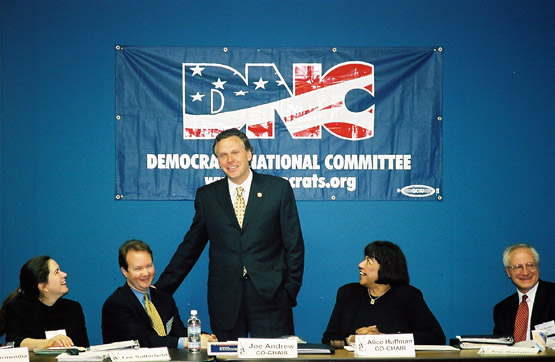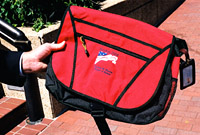
 |
| DNC deputy chief operating officer Lee Satterfield, advisory committee co-chair Joe Andrew, DNC chair Terry McAuliffe, advisory committee co-chair Alice Huffman, and DNC general counsel Joe Sandler enjoy a light moment during the committee's first meeting. |
 Washington,
DC. May 22, 2002. New York City boosters brought cigars for
the chairman and a "taste of New York" sampling of desserts for committee
members. The DetroitMetro Convention & Visitors Bureau prepared
a bag filled with baby items, a gift for the chairman from Mayor Kwame
Kilpatrick. Representatives from the City of Boston arrived with
about 50 stylish red soft-sided briefcases emblazoned with the Boston 04
logo.
Washington,
DC. May 22, 2002. New York City boosters brought cigars for
the chairman and a "taste of New York" sampling of desserts for committee
members. The DetroitMetro Convention & Visitors Bureau prepared
a bag filled with baby items, a gift for the chairman from Mayor Kwame
Kilpatrick. Representatives from the City of Boston arrived with
about 50 stylish red soft-sided briefcases emblazoned with the Boston 04
logo.
Members of the DNC's 2004 Democratic National Convention site advisory committee held their first meeting today, and representatives from three of the four cities competing to host the party's 2004 national nominating convention were present and eager to help make a good impression. DNC Chair Terry McAuliffe's wife Dorothy had within the past week given birth to the couple's fifth child, hence the cigars and baby items. Jonathan M. Tisch, co-chair of New York's host committee and a friend of McAuliffe's, sent the cigars. Susan Sherer from the DetroitMetro Convention & Visitors Bureau prepared the gift bag for McAuliffe; it included such items as little T-shirts from the city's four professional sports teams (Tigers, Lions, Red Wings and Pistons), baby washes, magazines, and cookies. "I'm a mom, and I picked this stuff out," said Sherer, noting that she had even managed to get a parking ticket while doing the shopping.
New York's host committee, perhaps acting on the old proverb that "the way to a man's heart is through his stomach," also decided it would be nice to provide a "taste of New York" for members of the site advisory committee. During a closed lunch, committee members sampled cheesecake from Junior's; fortune cookies from Won Ton Foods; bread pudding from Sylvia's Restaurant; flan from Old San Juan's; baclava from Omonia Cafe in Astoria; canoli from Rocco's Italian Cafe; and chocolates from Li-Lac's.
In considering the possible convention sites, members of the advisory committee will in the end give more heed to budget numbers and infrastructure than briefcases, baclava, and baby items, but if there is wavering between two cities such thoughtful gestures could ultimately tip the balance in favor of one city or another.
At today's meeting, members of the advisory committee did preliminary reviews of the four proposals, heard from technical experts about some of the factors they will have to weigh, and determined to visit the four cities still in contention--Boston, Detroit, Miami and New York. The meeting was also a chance for the members of the committee to get acquainted with each other.
The advisory committee will make site visits in June and July, and, as an economy measure, members will divide up the visits so that each person will visit two of the four competing cities. The committee will make its final recommendations to McAuliffe in late summer. The DNC will announce the site in fall 2002.
Advisory committee co-chair Joe Andrew said the committee will be seeking the host city that is "best for our delegates and the best for the nominee." It will require, he said, "the forging of a unique partnership." In addition to the infrastructure requirements, the committee is seeking as much budget flexibility as possible. "We want to be able to move things from one budget area to another," Andrew said.
In an earlier interview, Andrew said the large size of the advisory committee reflects the party's efforts to be very inclusive and to reach out to people from different geographic, racial, and experiential backgrounds. Serving on the 40-person committee, named by McAuliffe in January 2002, are people such as Willie Brown, mayor of San Francisco; Pepper English, vice president of congressional relations for Bell South; Fred Baron, 2000-2001 president of the Association of Trial Lawyers of America; Alma Brown, widow of former DNC chair and Secretary of Commerce Ron Brown; Larry Scanlan, political director for AFSCME; Calvin Smyre, a state representative from Georgia who chairs the House Rules Committee; and David Mixner, a writer and fundraiser prominent in the gay and lesbian community.
The DNC has a number of staffers working on the convention process, headed by deputy chief operating officer Lee Satterfield. Zoe Garmendia wrote the RFP and did much of the analytical work in preparation for the meeting.
In the back of the room, closely watching the proceedings, were representatives from Boston (Julie Burns, deputy chief of staff to Mayor Menino and Howard R. Leibowitz, director of the Office of Intergovernmental Relations for the City of Boston), Detroit (Brad R. Van Dommelen, senior vice president for strategic business development at the Convention & Visitors Bureau; Susan Sherer, tourism economic development advisor from the CVB; and Chandra Oden, director of executive relations for Mayor Kilpatrick); and New York (Andrew Stern, senior vice president of the New York City Economic Development Corporation; Demetrios Ganiaris assistant vice president of the NYCEDC; Kevin Sheekey, special advisor to Mayor Bloomberg; Emma Bloomberg, assistant to Sheekey; and Jeff Stewart, director of public communications for Loews Hotels and an assistant to Tisch working on the host committee).
These three cities and Miami are all that remain from the 34 cities that the DNC initially invited to pursue the convention. Cost was a major consideration for many of the cities that took themselves out of the running. For example, in a phone interview Greg D. Ortale, president and CEO of the Greater Minneapolis Convention & Visitors Association, estimated the cost just to pursue a bid at between $250,000 and $500,000.
Putting on the convention itself is a very costly proposition. Advisory committee co-chair Joe Andrew said that Los Angeles spent $25.9 million on the 2000 convention and Chicago spent $23.5 million on the 1996 convention; further, he said, those numbers do not include security and host committee spending which brought the costs to $35 million and $32 million respectively. Budget numbers in at least two of the cities' proposals are significantly higher, in the $41-$51 million dollar range. The biggest items are the convention complex and security.
At one point during today's meeting San Francisco Mayor Willie Brown, a member of the advisory committee, joked, "I'm here to seek assistance in retiring the city's bill from '84." [San Franciso hosted the 1984 Democratic Convention]. While the costs are significant, the returns are also great. Andrew said the 2000 convention had brought economic benefits of $147 million to Los Angeles and the 1996 convention had brought $130 million into Chicago.
In the next two months the four would-be host cities will be doing what they can to persuade members of the advisory committee to select their cities. The date of the convention remains unsettled; it had been tentatively set for mid-July 2004, but in view of the Republicans' decision to hold their convention starting on August 30, 2004, McAuliffe is weighing moving it to a later date.
Copyright 2002 Eric M. Appleman/Democracy in Action